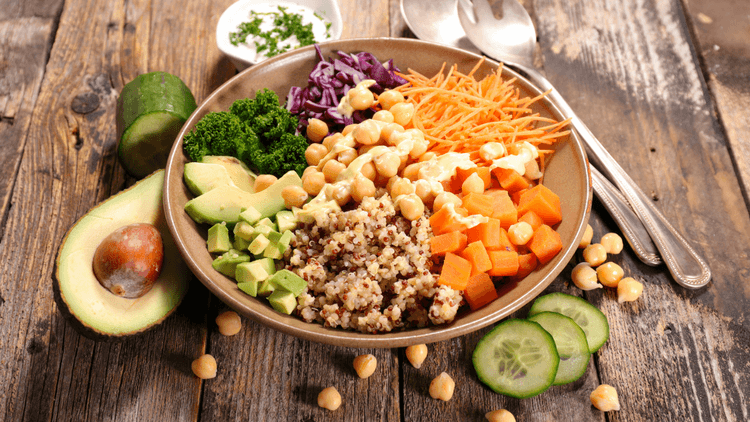It’s Veganuary, which means thousands of people are enjoying a month of veggie burgers and nut roasts. Veganism has grown in popularity over the past few years, and it’s no longer just a trendy diet for college students; it’s become a way of life for people all over the world.
Going vegan is a great ethical choice to make, and some studies have suggested it could have a hugely positive impact on your weight loss and overall health. But can you really lose weight by following a vegan diet?
We take an in-depth look at the fact and fiction of veganism.
Could you lose more weight as a vegan?
In theory, yes. As a vegan, you’re forced to think more about your diet. You can’t simply grab a Big Mac on your way home from work, or eat the entire box of chocolates someone got you for Christmas in one sitting. You have to check ingredients, research vegan-friendly restaurants and plan your meals ahead of time.
Thinking about what you’re eating and planning your meals is one of the key elements to sustainable weight loss. If this is something you struggle with, following a vegan diet for a month could help you get in the habit of making more conscious choices with your meals.
Another reason a vegan diet can help boost your weight loss is vegan alternatives – such as veggie burgers, mac and cheese, and lasagne – are almost always lower in calories and fat than their meaty/cheesy relatives. They also tend to include more nutrients, because they’re filled with vegetables and plant-based proteins. For example, many veggie burgers are made from beans, which are packed with antioxidants, vitamins and protein.

Is veganism better than other diets?
Like all diets, it depends on what you’re eating. If you replace the calories in meat and dairy with huge amounts of bread and Oreos, you’re unlikely to lose any weight. Limit your empty carbs – such as bread and white rice – and focus on including more nutrient-dense and whole foods into your diet.
However, if you follow a healthy, low-fat vegan diet, it could be more effective than other traditional diets. A study by the Obesity Journal found that a vegan diet results in significantly greater weight loss than other moderate, low-fat diets. Further studies comparing veganism to typical diets – such as the Atkins diet – have also found that a vegan diet results in a greater weight loss.
One positive element of a vegan diet is the community behind it. Unlike diets that focus on calorie restriction and cutting down portions, vegan recipe books and blogs encourage you to think about what you can eat, instead of what you can’t. It forces you to become more creative in the kitchen, and can help you discover new ways to cook fruits and vegetables. Because of this, following a vegan diet can have a positive impact on the way you think about food in the long term.
Read: Weight loss benefits of vegetarian diet
Is being vegan unhealthy?
This really depends on you. An omnivore diet is not necessarily unhealthy, but if you’re binging on fast food and candy, you’re body isn’t getting the nutrients it needs. The same applies to veganism.
A vegan diet is naturally packed with some vitamins that a meat-heavy diet is lacking, like vitamin C, fiber, magnesium and folic acid. However, veganism can also be lacking in some key vitamins, so here’s a few to think about when you’re following a plant-based diet:
-
Protein: “Where do you get your protein?” is a question that’s asked a lot. The answer is simple: nuts, beans, lentils, chickpeas, tofu, soya products, whole wheat pasta and bread – even some packs of potato chips have a few grams of protein. .
-
Vitamin B12: Both omnivore and vegan diets can result in a B12 deficiency, but the risk is higher for vegans. Look for foods fortified with B12, like Marmite/Vegemite, nutritional yeast, cereal and milk alternatives. If in doubt, take a B12 supplement.
- Calcium: The easiest way to get the calcium you need is from milk alternatives, such as soya, almond or oat milk. However, a lot of tasty foods are also rich in calcium: tofu, tempeh, kale, bok choy, almonds and broccoli are all great options.
As long as you’re getting enough vitamins, protein and calories, a vegan diet should be a healthy choice. In fact, it’s often healthier than a traditional omnivore diet, because vegans tend to eat a lot more fruits and vegetables. A plant-based diet can also have numerous health benefits, particularly when adopted by people struggling with obesity.
Studies have shown that people following a vegan diet tend to have a lower BMI, as well as lower cholesterol and blood pressure, and a reduced risk of heart disease.
Should you try a vegan weight loss plan for a month?
Absolutely! Being vegan, even if it’s just for a short period of time, can boost your weight loss and have a positive impact on your overall eating habits. If you’re not ready to give up all animal products, why not start small? Try cutting down on dairy and meat, and enjoy a meat-free day once or twice a week. The important thing is eating better, instead of simply eating less.
To really kickstart your 2018 weight loss, try taking PhenQ alongside your vegan diet. PhenQ is 100% vegan, and it helps to suppress your appetite, boost your energy levels and encourage your body to burn more fat. When combined with a healthy, plant-based diet, you’ll be shedding pounds in no time!




